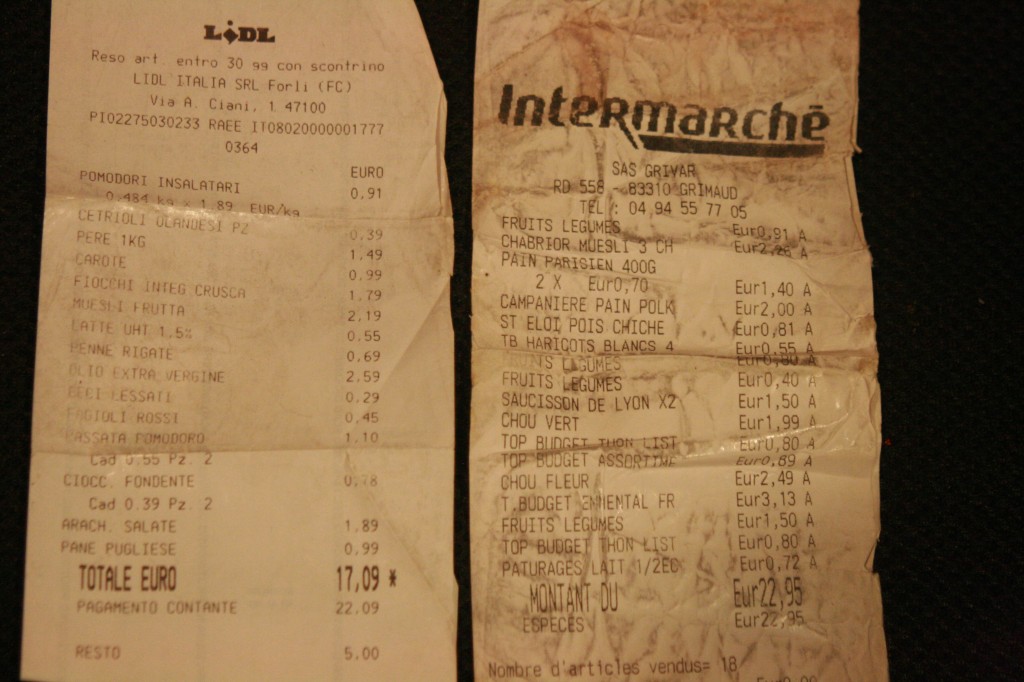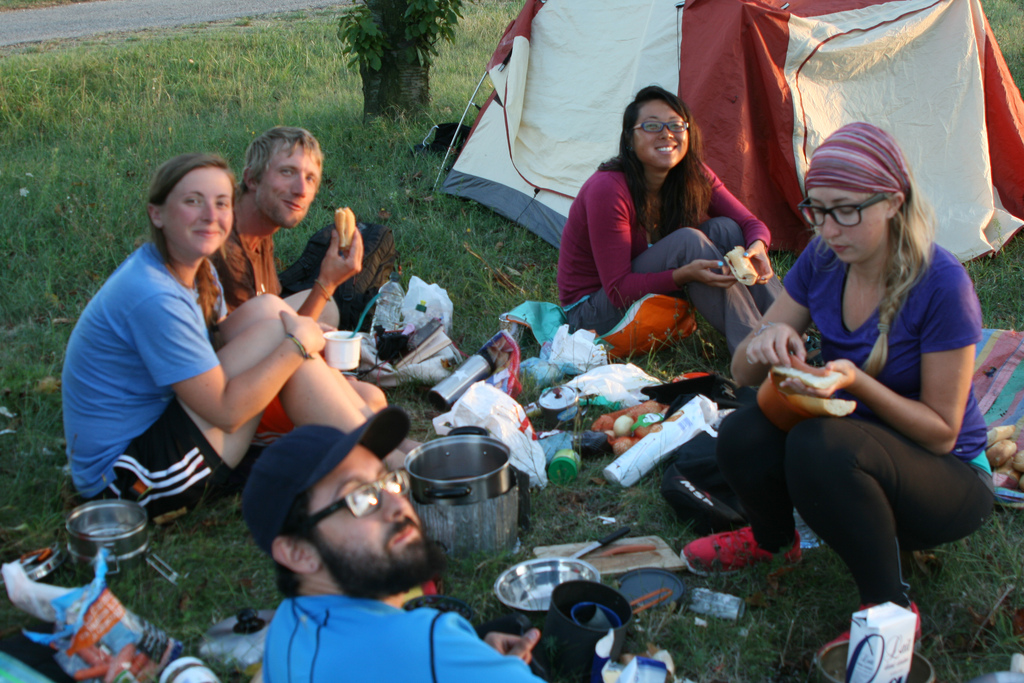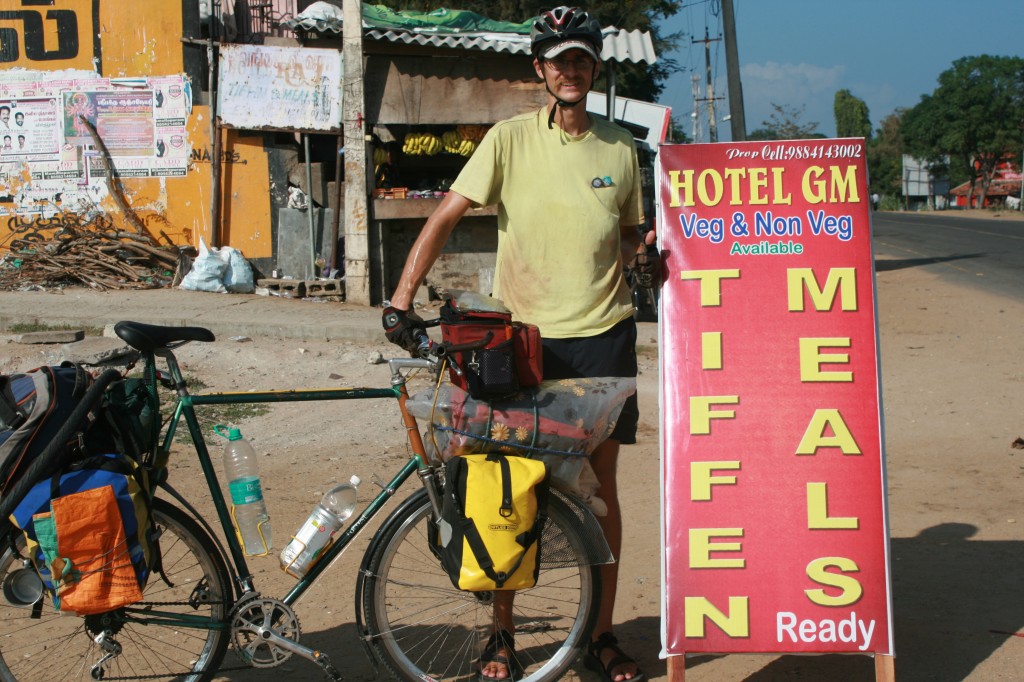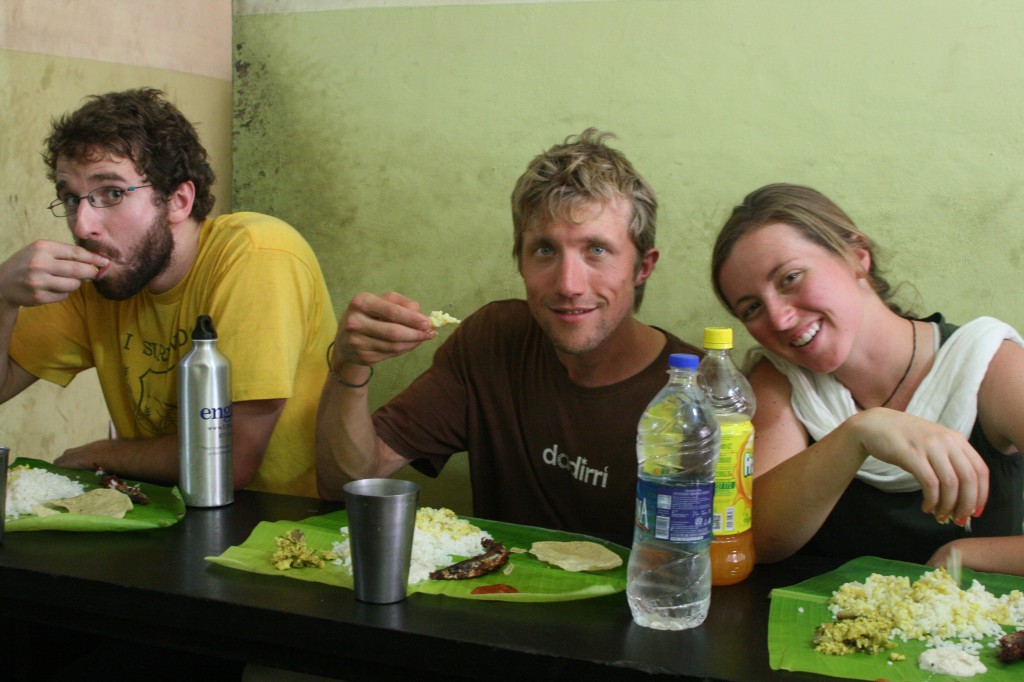No, this is not a flash back to the 1960s (Europe didn’t have Euros then anyways) – this is legitimately possible in 2013: to live on 5 Euros a day per person in Europe or anywhere, and even less in developing countries. Most guidebooks today suggest 50 Euros a day in Europe and call it “on a shoestring.” How then, is it possible to cut expenses by 10x this amount on the most expensive continent in the world?
Lifestyle Choice.
Just what do I mean by that? Connecting to my previous blog on happiness, all my travels over the last decade (living abroad and two Eurasian bicycle journeys), and my study and work in international development have focused me on this one all encompassing package of daily decisions we all must make: how much we spend, how much and what we consume, where we live, what we eat, how we move around, how we live. This also connects to the second pillar of Fueled By Rice: “Simplicity.” In the spirits of Henry David Thoreau and Rich Dad Poor Dad author, Robert Kiyosaki, I’d like to explore the nitty gritty euros and cents behind our bicycle journey.
Some may look at our travels and wonder, “How do they afford that kind of 6-12 month trip without working during that period? Who is sponsoring them? What a luxury! I will never be able to take that kind of trip, it must be so expensive.” For example, on our first Fueled By Rice trip in 2008, comments on a LaCrosse Wisconsin USA newspaper article about us included some rather bitter speculating by readers who assumed that our rich parents were funding us – how wrong they were!
I am here to share the truth that nearly anyone in the US and other developed countries could afford this kind of extended travel, and many in developing countries could too for that matter. We all have the power to choose how we spend our money, though constraints vary. The economic term is Opportunity Cost: “the cost of any activity measured in terms of the value of the next best alternative forgone (that is not chosen).” Basically, sacrifice and self-restraint in some areas of expenditure is needed to be able to do what one wants in other areas – one can’t have it all so we must choose. Henry David Thoreau realized at Walden Pond that if we don’t buy stuff, we don’t need to spend our time earning that money. Now, I do appreciate the fact that not everyone wants to travel and see the world, or do not prioritize travel over family – I respect that. Yet, I think many of us do, actually, desire to see the world – to see how others live and to expand our horizons to new possibilities and alternatives for our own lives that we never dreamed possible before. My main point is simply that if you desire to travel for 6-12 months (or longer), it is much more financially possible than you may think. I am convinced that most people without children could choose to save up US$4000/person for 1 year of bicycle travel given 6 months to 2 years of saving, and even those with children given 3-5 years.
There are all kinds of ways to cut spending before traveling to save up, but here I will focus on our expenses while on the road. The whole endeavor before and during this kind of trip is an experiment in simple living and constantly asking one’s self – What do I REALLY need? Usually one finds the answer is “less than I thought.” The biggest expense items while traveling (and not traveling too!) are housing, transport, and food.
Housing
Since housing is the most expensive single expense, in Europe we simply cut it out completely (or mostly). In Europe, to stay within our 5 Euro/day/person budget we did not stay in hotels, youth hostels, or even official camp grounds – we free camped next to corn fields, rivers/streams, in woods, or in people’s yards after asking them (gardens as the Europeans call them). We also stayed with free hosts in their homes once every 1-2 weeks (with people we spontaneously met or arranged on-line through www.warmshowers.org or www.couchsurfing.org – a fantastic use of the internet). In Asia though, we can afford cheap guesthouses (US$1 – 3/person) most nights, with camping and free hosts on other nights.
For us, the opportunity cost of lower comfort (but often better scenery) by camping in Europe instead of staying in hotels is worth the extra days of travel we gain. For example, a cheap hostel or hotel in Europe is usually at least 15-25 Euros/person/night (and I’ve spent as much as 30 Euros a night for just a dorm bed in Amsterdam). Based on our 5 Euro/person/day budget, that equates to 3-5 more days in Europe traveling for every one night we do not stay in a hostel/hotel. This is an incredible exponential savings that in just one week of camping gives us an additional 21-35 days of travel, and over one month gives us an additional 84-140 days of travel (2.8 – 4.6 months!). For us, it is an easy opportunity cost choice. But I realize that for others, greater comfort is worth more than quadrupling travel time. Or another example, some think one US$3.00 Starbucks drink is worth more than 3/5 of a day traveling in Europe (or anywhere) by bicycle, or if bought daily over a year – US$1,095/year and 162 days of travel). But it is a choice. Everyone could save and travel if they really wanted. In Asia though, we can keep the same budget but live at a higher living standard should we choose.
Transport
A bicycle replaces all petrol/gasoline consuming transport except for flights to start and end a trip (and mandatory jumps such as over Iran for Americans who must have a government tour guide which was too expensive for us [US$100/day], and over Burma/Myanmar which does not allow by-land border crossings). No train or bus tickets means huge savings. For example, in Europe, a 4-6hr train ride often winds up being around 80-100 Euros. When I studied abroad in Germany, at the end I traveled for 3 weeks around Europe using the popular Eurail pass which cost around US$500. US$500 now equals 371 Euros, which divided by 5 Euros a day = 74 days (2.5 months – over 3x my original 3 week trip) of bicycle travel that I could have done with just my train budget! And of course, a bicycle is much better for the environment, my health, my happiness, and reducing middle-east funded terrorism activities than petrol/gasoline transport – be fueled by rice and pedal not petrol!
Food
That leaves us with food – comprising our entire 5 Euros/person/day budget in Europe. The key is that we rarely (about once per country) ate in restaurants or went to bars in Europe because they are expensive. What about eating local food you ask? Some of our weekly hosts cooked us such meals. In Asia though, we usually eat in restaurants because meals are only US$1-3. So, in Europe we went to grocery stores and open markets like normal local people to buy our raw food, like all of us do at home (only we went daily to minimize weight). We also chose discount grocery stores, of which the German brand Lidl [lee-del] (like Aldi but with a bit more variety) wound up being both our favorite and the most common through out all of Europe. We ate two cold meals (breakfast and lunch) and one hot meal (dinner)a day cooked with our single burner camp stove(s) that can burn any liquid fuel including diesel (unleaded petrol/gasoline is the easiest to come by).
Our typical European meals looked like this:
Breakfast: Muesli and milk, fruit
Lunch: Sandwiches with plenty of European cheeses and sometimes meat, veggie salad or fruit/yogurt salad
Dinner: Pasta, rice, or potato base with lots of cooked veggies alternating spicing schemes, sauces, and soup vs stir fry
Snacks: lots of nuts, fruit, and discount chocolate bars
As Henry David Thoreau included an itemized list of his expenses to show how cheaply he could live, here are two of our daily receipts from Lidl and Intermarche when we were four traveling (after Tori’s injury in France). Keep in mind that anyone who knows me knows that I am a BIG eater, especially when I’m biking 50-70km a day, so we did not skimp on quantity:
The discount prices at Lidl, especially on items like Muesli (2.60 euros for 1 kilo [2 lbs]) and chocolate bars (30-60 cents/big bar) certainly helped us out. It is all a matter of scoping out the grocery stores and seeing what is cheap yet nutritious and getting creative with those ingredients. That said, when we are living more permanently in a community with more money to spend, most of us do value paying more for higher quality raw foods from farmers’ markets. That is a compromise we made on this trip.
At one of the many Lidls we shopped at:
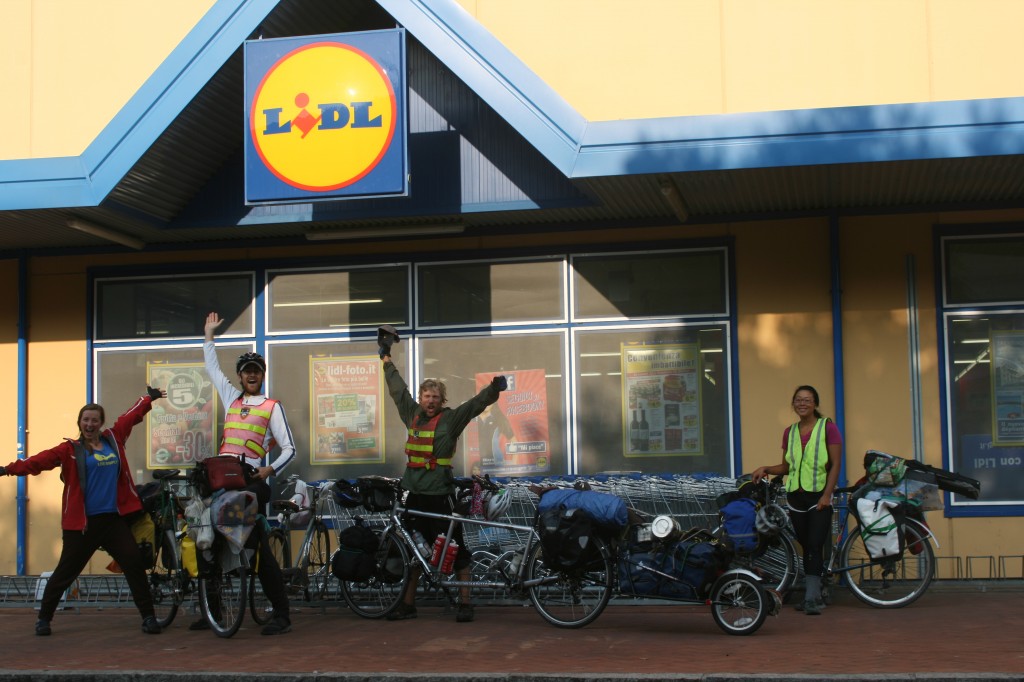
In India, we were eating “meals” for lunch, which is like thali or dahl baht full in northern India, where one gets rice and several sides and one can eat as much as they like. Price: US$0.75-2.50. Amazing. Most of the group did get a bit sick of “meals” after a while, and most of us actually got sick at some point, but I recovered and embraced meals just as heartily as before without negative consequence.
Meals – coming around to serve up more
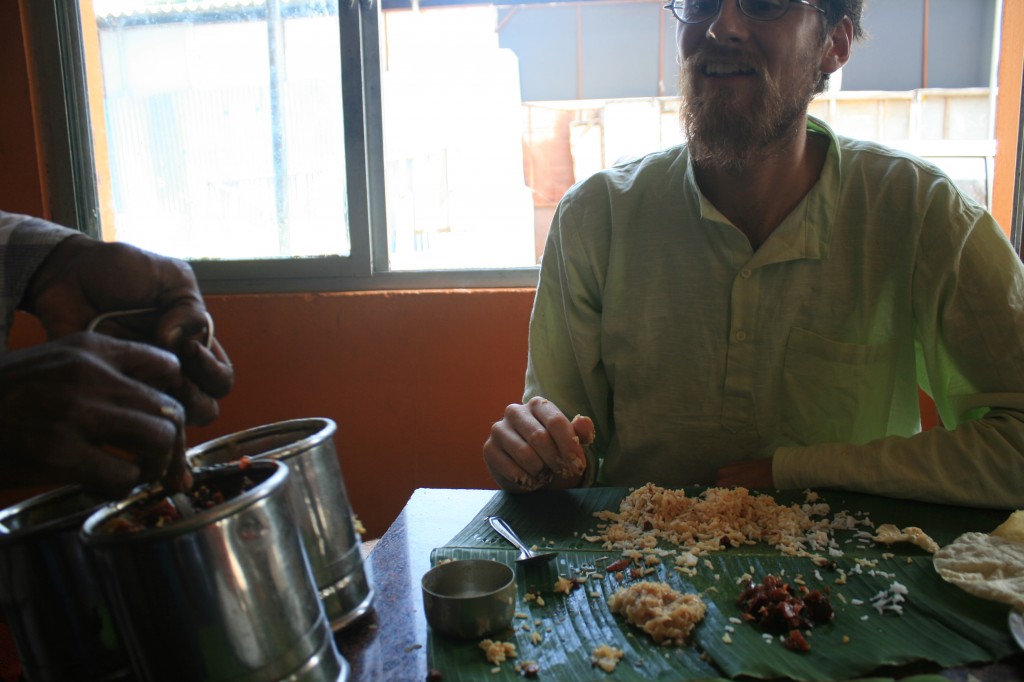
Travel and Health insurance may be another concern, but there are many international insurance options out there that are much cheaper (and only for big emergencies) than normal domestic health insurance. I have used World Nomads, which is roughly around US$400/6 months. But for most minor injuries in most countries outside the US, it is usually cheap enough to just pay out of pocket without filing claims.
Final Thoughts:
Extended travel is not as expensive as you think. The hardest part for most people is getting the time, which requires taking the leap of faith away from the security of a job and a brick and mortar home. Certainly selling a home to eliminate mortgage payments is a big hurdle for homeowners. Renting out one’s home one’s self or through an agency is one solution. Eitherway, there are many extended travel bicycle couples out there who have done it. You can too!
Many postpone major world travel until they “have money” or are retired. However, while its never too late to start, we’ve talked several times together as a team and have discovered that traveling while young (though continuing to travel throughout one’s life) makes much more sense for several reasons including these five:
1) Easier to get away without responsibilities (i.e. job, mortgage, and children) or the effort of getting out of these responsibilities tying one down.
2) It is easier to keep it cheap because one is more accustomed to simpler living standards (i.e. willing to camp and stay in cheap and potentially dirty guesthouses, taking mass transit like subways and buses instead of renting a car or taking taxis).
3) One is more likely to be physically able when young to get around, hike, bike, or just walk around a city. Renting cars and taking taxis add costs and negative ecological and political consequences mentioned above.
4) There are no guarantees one will live to a certain age in the future. Better to do it (and pursue all of our most important goals and dreams) now if it’s something one wants to do “sometime.” As Dave Matthews sings in Cry Freedom, “The future is no place to place one’s better days.”
5) Although one has less money when young, there is more payback, benefit, and reward over the rest of one’s lifetime including everything learned and one’s changed perspective on life and what’s important. This will impact and potentially change life decisions, career path, lifestyle choices, etc. hopefully for the better.


![[35] 1- 28x42 cm (Peter Ehresmann)](http://farm5.staticflickr.com/4134/4755251928_a274fc08bb_o.jpg)
